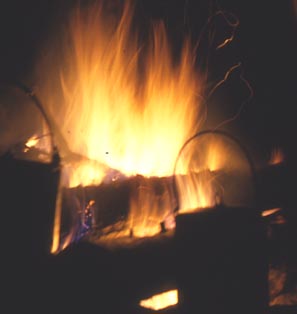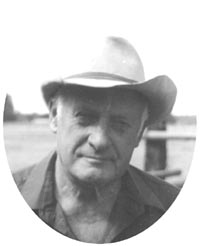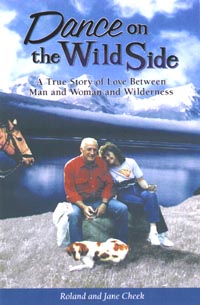a weblog sharing info on outdoor skills and campfire musing by a guy who spends a bunch of time in pursuit of both
CULTURE
WHERE -
TALES ARE TOLD OF
Welcome to Roland Cheek's Weblog
Roland is a gifted writer with a knack for clarifying reality. Looking forward to more of his wisdom
- Carl Hanner e-mail
When I say I believe in a Square Deal I do not mean, and nobody who speaks the truth can mean, that he believes it possible to give every man the best hand. If the cards do not come to any man, or if they do come and he had not got the power [skill] to play them, that is his affair. All I mean is that there shall not be any crookedness in the dealing.
[With today's growing class disparity amid rampant crooked dealing, where's Teddy when we really need him?]
To access Roland's weblog and column archives
Tip o' the Day
The retired forest ranger told of his experiences taking a group of boys out to work as volunteers on trail projects. "There's nothing wrong with today's kids," the man said. "They're just as good as kids ever were. Our problem is we've emplaced a system that won't let them work."
He's right. It's easy to recall how naysayers of my youth claimed kids of that day weren't worth the powder to blow 'em to hell. Isn't it ironic those same kids who were so reviled in my youth are (now that they are grandparents) so critical of kids today?
Like the retired ranger, I believe in today's kids. I believe most of them want to work; want to do a good job; want to be respected (and praised) for their performance. Their problem--what my contemporaries believe mirrors laziness and an unwillingness to work--is the same problem of youth of any age: they have trouble seeing work that needs to be done.
I hired young guides back in the days when I led guests to adventure in some of the ruggedest lands in all the northern Rockies. Without exception, those guides came to my outftt with a willingness to work and a driving desire to please. What they lacked was experience. How could they possibly understand the importance of adjusting an off-kilter pack before it rubbed a sore on the horse's back without first soring a horse? How could they know to mantie everything possible the night before pulling out for hunting camp without experiencing the time gain on the following morning?
They couldn't unless they were told. Then they still had to be shown how to accomplish it. But Lord did they know how to work! They worked from daylight to dark, day in and day out. They worked for little money and few material rewards. They worked for the sheer joy of "being" part of adventure, "because" of a zest for the outdoors, and "for" a love of wildlife.
The second half of the old ranger's critique constitutes a definite problem: that we've emplaced a system keeping kids from doing the kinds of quality work they'd like to achieve. Three "ell" words preventing them are laws, liability, and litigation.
I once read a truth I believe to be especially appropriate for this thesis. I don't know its source and my delivery may lack polish, but here it is: "Generation after generation, the very young do the impossible because no one bothered to tell them it is impossible."
That's my final word on the youth of today, except for this: There are three requirements for top performance for all people: 1) work at something you want to do. 2) be praised occasionally for a job well done; 3) receive a living wage.
If you are an employer and wish to receive top performance from your workers, pays special attention to 2) and 3).
MAY DANGERS
May is not a simple time for the outdoors person. During a half-century or so of spring travel I've been both smitten and bitten so many times by the month's foibles that I've learned to be wary--May can be dangerous.
But who can remain tethered to neon lights when snowfields retreat up distant mountains? Who isn't thrilled by greening meadows and riots of wildflowers? Bighorn lambs and wapiti calves aren't the only creatures wishing to gambol amid the frenzy of spring. And, as happens with humans who fail to demonstrate proper respect for nature's dark side, careless wildlife die at the zenith of their abandon: from falls from cliff faces, in flood-swollen streams, under avalanches or rock slides.
I once watched helplessly while one of my companions rocketed down a frozen, snow-covered chute, crashing finally into a water-cut crevasse filled with outsized boulders and rampaging rapids. That she wasn't more seriously injured was a credit to the lady's selection of sturdy ancestors than our own natural instinct for preservation.
But of all spring's backcountry hazards, none are as formidable as streams in flood. Even rivulets that are but trickles later in summer can be treacherous to cross at peak of spring run-off.
Let's say weather is shirtsleeve at the trailhead and unseasonably balmy throughout the day. Thunderheads build in the southwest during the forenoon and you're hurrying to reach a grassy glade you know is just beyond yon creek. But what's this? The creek is chocolate brown and in a rampaging torrent. It's spring run-off.
You and your party members mill, debating your proper course. If you're backpacking, you'll search for a fallen log spanning the creek, or a narrows where you can leap from one bank to another. If you're horsepacking, you'll look for a wide gravel bar where the creek, though swift, is shallow and broad.
"Let's go back," some say.
"It's just a little farther," others say.
Finally one member of your party cuts a sturdy staff and tests the water. If he's strong and agile, and not given to panic, he'll reach the other side. If he's smart, he'll throw his staff back across for others to use, then help rig a line for safety purposes. If the members of your party are really smart, they'll float their backpacks across, using towlines. If your group is not unlucky they'll all make it.
Every year, though, someone, somewhere doesn't.
If you must go, don't hurry your choice of crossing places. One May, Jane and I were at White River Park, sitting on a high bank that overlooks the river's flood plain. We spotted a lone backpacker at some distance, watching as he scouted for a suitable crossing place. The one he chose, we could see from our height was not as good for wading as one another fifty yards upriver. The problem in determining the best crossing was that the river was broad at that location, and braided to confusion. In addition, the stream was noisy and boisterous. And we were so distant there was little chance to shout instructions to the man.
He forded with with the help of a sturdy staff and a great deal of difficulty, then sprawled on the far shore to dump water from his boots and change socks and underwear.
The lesson for us was that one obtained a much clearer picture of the river and its channels from a high vantage.
The lesson for him was that he should lay his head atop his backpack and take a nap while his boots dried in the brisk air and bright sun of a wilderness spring day.
Jane and I so appreciated learning his lesson that I leaned against a big yellow pine and closed my eyes; she sprawled with her head propped on my belly button and did the same.
Roland Cheek wrote a syndicated outdoors column (Wild Trails and Tall Tales) for 21 years. The column was carried in 17 daily and weekly newspapers in two states. In addition, he scripted and broadcast a daily radio show (Trails to Outdoor Adventure) that aired on 75 stations from the Atlantic seaboard to the Pacific Ocean. He's also written upwards of 200 magazine articles and 12 fiction and nonfiction books. For more on Roland, visit:
www.rolandcheek.com
Recent Weblogs
Tuesday, May 12, 2009
for more info about these and other Roland Cheek books
There's a bunch of specific info about Roland's books, columns, archives and radio programs. By clicking on the button to the left, one can see Roland's synopsis of each book, read reviews, and even access the first chapter of each of his titles. With Roland's books, there's no reason to buy a "pig in a poke."
for detailed info about each of Roland's books
Read Reviews
Read their first chapters
For interested educators, this weblog is especially applicable for use in history classes, as well as for journalism students.
Roland, of course, visits schools. For more information on his program alternatives, go to:
NEXT WEEK:
MARKING THE SPOT
www.campfireculture.com
Too honest to deny its roots in hunting, but too human to be contained by its limits, The Phantom Ghost of Harriet Lou is a book for those who care about wildlife of all kinds.
Check out Roland's office: sun roof, daylight basement, and no parking problems. Short takes, sage wit, large humor, all gleaned from a lifetime outdoors
Good grizzly mother? Or a savage killer. Your choice. An entire book about the life of a single charismatic grizzly bear
9 X 12 coffee table book about the best loved chunk of wild country in America: the place? Montana's Bob Marshall Wilderness . . . When? Then and now -- and always will be -- the way God made it.
source links for additional info
to send this weblog to a friend
to tell Roland what you think of his Campfire Culture weblog
to visit Roland's newspaper columns and weblog archives
- Theodore Roosevelt
To learn more of Roland's & Jane's exciting life as outfitters and guides in the Bob Marshall Wilderness, read Dance On the Wild Side
Learning To Talk Bear is Roland Cheek's best selling book -- now in it's 5th printing.
Safety in bear country? Of course! But this book also teaches the reader about the animals themselves.








